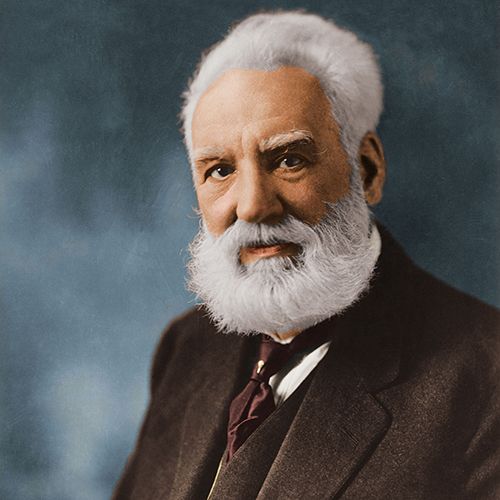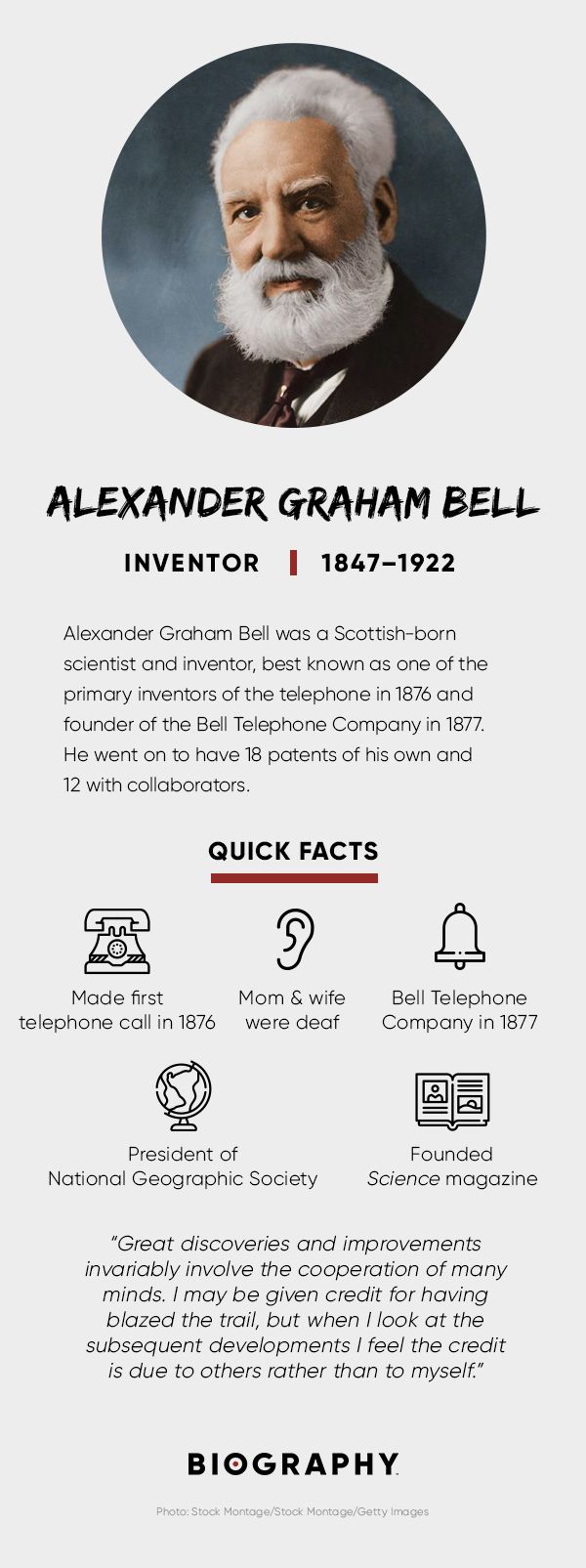You are viewing the article Alexander Graham Bell at Lassho.edu.vn you can quickly access the necessary information in the table of contents of the article below.

(1847-1922)
Who Was Alexander Graham Bell?
Alexander Graham Bell was a Scottish-born scientist and inventor best known for inventing the first working telephone in 1876 and founding the Bell Telephone Company in 1877.
Bell’s success came through his experiments in sound and the furthering of his family’s interest in assisting the deaf with communication. Bell worked with Thomas Watson on the telephone, though his prodigious intellect would allow him to work on numerous other inventions, including flying machines and hydrofoils.
Early Life and Family
Bell was born in Edinburgh, Scotland, on March 3, 1847. The second son of Alexander Melville Bell and Eliza Grace Symonds Bell, he was named for his paternal grandfather. The middle name “Graham” was added when he was 10 years old.
He had two brothers, Melville James Bell and Edward Charles Bell, both of whom died from tuberculosis.
During his youth, Bell was strongly influenced by his family and his environs. Bell’s hometown of Edinburgh, Scotland, was known as the “Athens of the North” for its rich culture of arts and science.
His grandfather and father were experts on the mechanics of voice and elocution. And Bell’s mother, Eliza, became an accomplished pianist despite being deaf, inspiring him to undertake big challenges.
Eliza home-schooled her son and instilled an infinite curiosity of the world around him. He received one year of formal education in a private school and two years at Edinburgh’s acclaimed Royal High School.
Though a mediocre student, Bell displayed an uncommon ability to solve problems. At age 12, while playing with a friend in a grain mill, he noticed the slow process of husking the wheat grain. He went home and built a device with rotating paddles and nail brushes that easily removed the husks from the grain.
Early Career
Young Alexander was groomed from a young age to carry on in the family business, but his headstrong nature conflicted with his father’s overbearing manner. Seeking a way out, Alexander volunteered to care for his grandfather when he fell ill in 1862.
The elder Bell encouraged young Alexander and instilled an appreciation for learning and intellectual pursuits. By age 16, Alexander had joined his father in his work with the deaf and soon assumed full charge of his father’s London operations.
On one of his trips to North America, Alexander’s father decided it was a healthier environment and decided to move the family there. At first, Alexander resisted, for he was establishing himself in London. He eventually relented after both his brothers died of tuberculosis.
In 1870, the family settled in Brantford, Ontario, Canada. There, Alexander set up a workshop to continue his study of the human voice.
On July 11, 1877, Bell married Mable Hubbard, a former student and the daughter of Gardiner Hubbard, one of his early financial backers. Mable had been deaf since her early childhood years.
Alexander Graham Bell’s Inventions
Bell is credited with inventing the telephone; in all, he personally held 18 patents along with 12 he shared with collaborators.
Telephone
On March 10, 1876, after years of work, Bell perfected his most well-known invention, the telephone, and made his first telephone call.
Before then, Bell in 1871 started working on a device known as the multiple or harmonic telegraph (a telegraph transmission of several messages set to different frequencies) upon moving to Boston. He found financial backing through local investors Thomas Sanders and Gardiner Hubbard.
Between 1873 and 1874, Bell spent long days and nights trying to perfect the harmonic telegraph. But during his experiments, he became interested in another idea, transmitting the human voice over wires.
Bell’s diversion frustrated his benefactors, and Thomas Watson, a skilled electrician, was hired to refocus Bell on the harmonic telegraph. But Watson soon became enamored with Bell’s idea of voice transmission and the two created a great partnership with Bell being the idea man and Watson having the expertise to bring Bell’s ideas to reality.
‘Mr. Watson, come here – I want to see you’
Through 1874 and 1875, Bell and Watson labored on both the harmonic telegraph and a voice transmitting device. Though at first frustrated by the diversion, Bell’s investors soon saw the value of voice transmission and filed a patent on the idea.
For now the concept was protected, but the device still had to be developed. In 1876, Bell and Watson were finally successful.
Legend has it that Bell knocked over a container of transmitting fluid and shouted, “Mr. Watson, come here – I want to see you.” The more likely explanation was Bell heard a noise over the wire and called to Watson. In any case, Watson heard Bell’s voice through the wire and thus, he received the first telephone call.
With this success, Bell began to promote the telephone in a series of public demonstrations. At the 1876 Centennial Exhibition in Philadelphia, Bell demonstrated the telephone to the Emperor of Brazil, Dom Pedro, who exclaimed, “My God, it talks!” Other demonstrations followed, each at a greater distance than the last.
The Bell Telephone Company was organized on July 9, 1877. In January 1915, Bell was invited to make the first transcontinental phone call. From New York, he spoke with his former associate Watson in San Francisco.
DOWNLOAD BIOGRAPHY’S ALEXANDER GRAHAM BELL FACT CARD
Other Inventions
By all accounts, Bell was not a sharp businessman and by 1880 began to turn business matters over to Hubbard and others so he could pursue a wide range of inventions and intellectual pursuits.
In 1880, Bell established the Volta Laboratory in Washington, D.C., an experimental facility devoted to scientific discovery.
Later in his life, Bell became fascinated with flight and began exploring the possibilities for flying machines and devices, starting with the tetrahedral kite in 1890s.
In 1907, Bell formed the Aerial Experiment Association with Glenn Curtiss and several other associates. The group developed several flying machines, including the Silver Dart.
The Silver Dart was the first powered aircraft flown in Canada. Bell later worked on hydrofoils and set a world speed record for this type of boat.
Legal Challenges
After their 1877 wedding, Alexander and Mable traveled to Europe demonstrating the telephone. Upon their return to the United States, Bell was summoned to Washington D.C. to defend his telephone patent from lawsuits.
Others claimed they had invented the telephone or had conceived of the idea before Bell. Over the next 18 years, the Bell Company faced over 550 court challenges, including several that went to the Supreme Court, but none were successful.
Even during the patent battles, the company grew. Between 1877 and 1886, over 150,000 people in the United States owned telephones.
Improvements were made on the device including the addition of a microphone, invented by Thomas Edison, which eliminated the need to shout into the telephone to be heard.
Later Life
Throughout his life, Bell continued his family’s work with the deaf, establishing the American Association to Promote Teaching of Speech to the Deaf in 1890.
Eight years later, Bell assumed the presidency of a small, little-known U.S. scientific group, the National Geographic Society, and helped make their journal into one of the world’s most-loved publications. Bell is also one of the founders of Science magazine.
Bell died peacefully on August 2, 1922, at his home in Baddeck on Cape Breton Island, Nova Scotia, Canada. Shortly after his death, the entire telephone system was shut down for one minute in tribute to his genius.
Thomas Edison
“],[“
Helen Keller
“]]” tml-render-layout=”inline”>
QUICK FACTS
- Name: Alexander Graham Bell
- Birth Year: 1847
- Birth date: March 3, 1847
- Birth City: Edinburgh
- Birth Country: Scotland
- Gender: Male
- Best Known For: Alexander Graham Bell was one of the primary inventors of the telephone, did important work in communication for the deaf and held more than 18 patents.
- Industries
- Science and Medicine
- Technology and Engineering
- Astrological Sign: Pisces
- Schools
- Edinburgh University
- Edinburgh Royal High School
- University College in London
- Nacionalities
- Scot (Scotland)
- Interesting Facts
- Alexander’s mother, who was deaf, was a profound influence on him. He later founded the American Association to Promote Teaching of Speech to the Deaf in 1890.
- At his core, Bell was an inventor and loved intellectual pursuits. He didn’t care for the business aspect of his growing telecommunications empire.
- After the invention of the telephone, Bell went on to create several flying machines and boats called hydrofoils.
- Death Year: 1922
- Death date: August 2, 1922
- Death City: Cape Breton Island, Nova Scotia
- Death Country: Canada
Fact Check
We strive for accuracy and fairness.If you see something that doesn’t look right,contact us!
CITATION INFORMATION
- Article Title: Alexander Graham Bell Biography
- Author: Biography.com Editors
- Website Name: The Biography.com website
- Url: https://www.biography.com/inventors/alexander-graham-bell
- Access Date:
- Publisher: A&E; Television Networks
- Last Updated: September 9, 2019
- Original Published Date: April 3, 2014
QUOTES
- Great discoveries and improvements invariably involve the cooperation of many minds. I may be given credit for having blazed the trail, but when I look at the subsequent developments I feel the credit is due to others rather than to myself.
- Before anything else, preparation is the key to success.
- Sometimes we stare so long at a door that is closing that we see too late the one that is open.
- A man, as a general rule, owes very little to what he is born with-a man is what he makes of himself.
- America is a country of great inventors, and the greatest of inventors are the newspaper men.
- Concentrate all your thoughts on the work at hand, the suns rays do not burn until brought to a focus.
- The nation that secures control of the air will ultimately control the world.
- The most successful men in the end are those whose success is the result of steady accretion.
- What this power is I cannot say; all I know is that it exists and it becomes available only when a man is in a state of mind when he knows exactly what he wants and is determined not to quit until he finds it.
Thank you for reading this post Alexander Graham Bell at Lassho.edu.vn You can comment, see more related articles below and hope to help you with interesting information.
Related Search:
